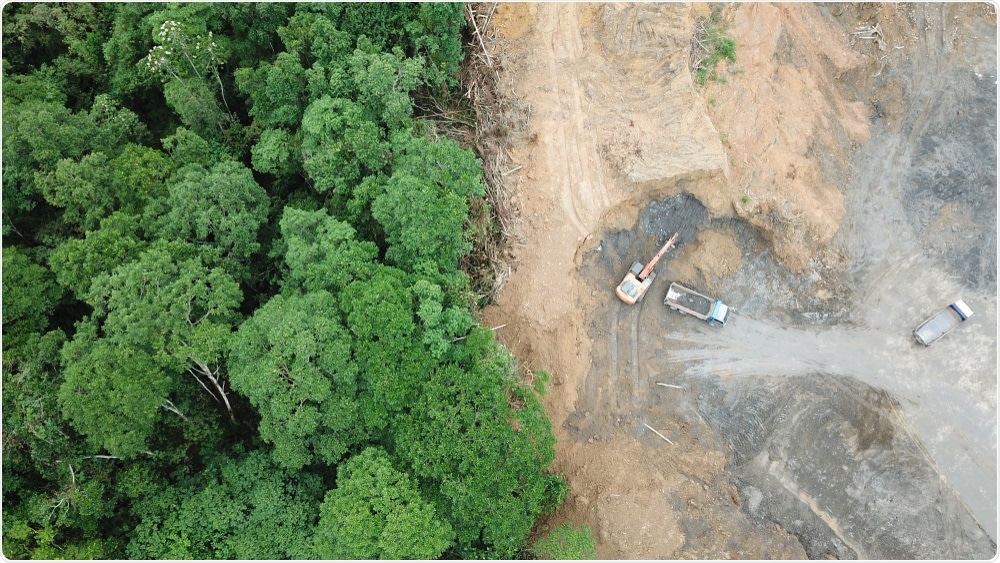The coronavirus pandemic, which has now infected nearly 19 million and killed more than 712,000 people, most likely originated from bats. Just like other coronavirus outbreaks in the past, a spill-over event or zoonosis caused the virus to jump from animals to humans.
The study, published in the journal Nature, highlights that animals are known to carry pathogens, or disease-causing microorganisms, were more common in areas that are intensively used by people.
Global changes in land use
The human race has altered more than half of the planet's habitable land to meet the needs of the ballooning population. Forests, deserts, and grasslands are now being turned into agricultural land, cities, and suburbs. As a result, animals begin to decline or disappear, while those who survive lose their land and resort to migrating to other areas.
When urbanization occurs, animals that are considered ecological specialists, i.e., they thrive only in a narrow range of environmental conditions or have a limited diet, tend to be the losers.
Animals called generalists, which are small and abundant, tend to win the ecological competition. These animals have fast and short lives, and are able to thrive in a wide variety of environmental conditions and can make use of a variety of different resources.
Generalist examples include rodents and bats. Omnivores are usually generalists. Herbivores are often specialists, but those that eat a variety of plants may be considered generalists. A well-known example of a specialist animal is the Koala, which subsists almost entirely on eucalyptus leaves. The raccoon is a generalist because it has a natural range that includes most of North and Central America, and it is omnivorous, eating berries, insects such as butterflies, eggs, and various small animals.
Study findings
In the study, the team revealed that the winners or generalists are much more likely to harbor disease-causing microorganisms or pathogens than their counterparts. As a result, when people convert natural habitats into cities and residential areas, they increase the chances of transmission of zoonotic infectious diseases, a phenomenon wherein viruses, bacteria, and fungi can jump from animals to humans. From there, human to human transmission can occur, leading to outbreaks and pandemics.
Many of the world's outbreaks and pandemics are caused by viruses and bacteria that come from animals, including the coronavirus disease (COVID-19), the severe acute respiratory syndrome (SARS), the Middle East respiratory syndrome (MERS), the human immunodeficiency virus (HIV) infection, H1N1 influenza, salmonellosis, plague, West Nile virus, rabies, and brucellosis, among others.
To arrive at the study findings, the researchers studied more than 6,800 ecological assemblages and 376 host species across the globe.
They found that known wildlife hosts of human-shared pathogens and parasites compose a more significant proportion of local species richness and total abundance in sites under human use, like urban, suburbs, and agricultural areas, compared to nearby undisturbed habitats.

Deforestation aerial photo. Rainforest jungle in Borneo, Malaysia, destroyed to make way for oil palm plantations Image Credit: Rich Carey
"The magnitude of this effect varies taxonomically and is strongest for the rodent, bat and passerine bird zoonotic host species, which may be one factor that underpins the global importance of these taxa as zoonotic reservoirs," the authors wrote in the paper.
Further, the team revealed that mammal species that harbor more pathogens are more likely to happen in human-managed ecosystems.
"Our results suggest that global changes in the mode and the intensity of land use are creating expanding hazardous interfaces between people, livestock and wildlife reservoirs of zoonotic disease," the team concluded.
The coronavirus pandemic
The coronavirus pandemic, almost certainly caused by an animal spill-over and has so far affected 188 countries and territories worldwide. The pandemic awakened the world to the threat that zoonotic diseases pose to humans, despite persistent warnings from researchers over the years. As the pandemic grows and evolves, many people have the misconception that 'wild nature' is the most significant source of zoonotic disease.
Now, the research team wants to emphasize that the greatest zoonotic threats rise where natural areas have been converted to pastures, cities, and croplands, where people thrive and live.
The study highlights the importance of restoring degraded habitat and protecting undisturbed natural areas to prevent other outbreaks from happening in the future. Further, the study underscores the importance of surveillance for known and potentially zoonotic pathogens in human-dominated areas. This way, scientists will know the risk of future outbreaks.
"The way humans change landscapes across the world, from natural forest to farmland, for example, has consistent impacts on many wild animal species, causing some to decline while some others persist or increase," Rory Gibb, lead author from the UCL Centre for Biodiversity & Environment Research, said.
"Our findings show that the animals that remain in more human-dominated environments are those that are more likely to carry infectious diseases that can make people sick," he added.
The research ties in with another paper released this week on the preprint server medRxiv that discusses the root causes underlying the emergence of such infectious diseases following their crossover of the line separating animal viruses from human. The paper adds further weight to the evidence that a growing number of contacts between animals in the wild and humans are driving the entry of animal viruses into the human community.
Source:
Journal references: